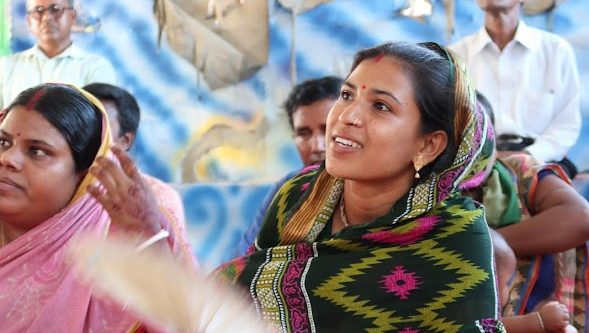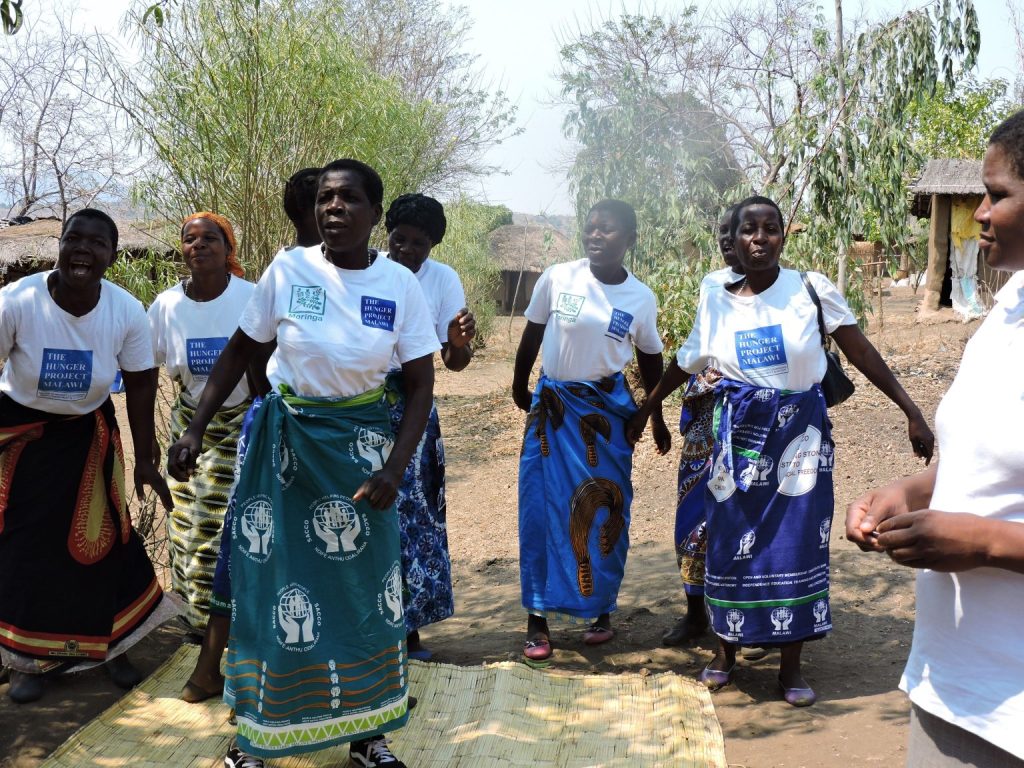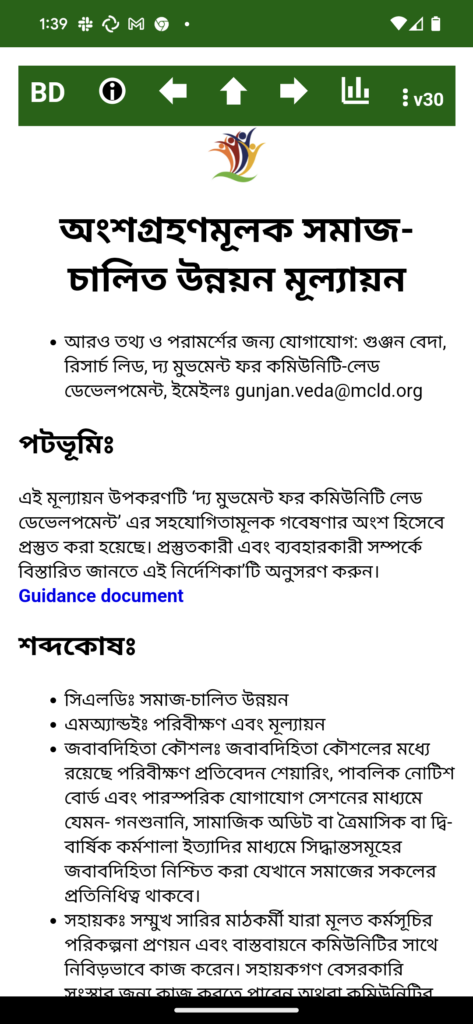
Tools to Strengthen CLD
Suporna from Khulna in Bangladesh, 2022. Photo for The Hunger Project
CLD Evaluation Tool
Ensure evaluations are rigorous and aligned with CLD principles
Purpose: Create dialogue among stakeholders through participatory reviews at various junctures of the program life-cycle to determine how the program aligns with the CLD characteristics, and enable reviewers and stakeholders to undertake course corrections, where agreed and needed.
How to Install: The tool is a Progressive Web App (PWA). This means you visit the link in your browser — https://mcldtools.github.io.
If you’ve not already installed it locally, you’ll see one of these symbols in your browser:

Click on it. On Android select “Install App.” On an iPhone or iPad, select “post on home page.” On Desktop Chrome a pop-up will ask if you want to install it and you click on “install.”
Local Data: The app keeps the data on your local device. Under the three-dots on the app, you have an option to email the data to someone, download the data to a file, upload a previous file of data, or view and print it locally.
Who Should Use this Tool? Program officers, funders, governments, community members, and NGOs.
When Should I Use it? It can be used at any stage in the life-cycle of a program, from program design to annual reviews, mid-term, end-line or ex-post reviews.
Nine-point framework:
A: Participation, Inclusion, and Voice
B: Local Resources and Knowledge
C: Exit Strategy Linked to Sustainability
D: Accountability Mechanisms.
E: Responsiveness to Context Specific Dynamics
F: Collaboration within and among communities
G: CLD linked to Sub-National Governments
H. Monitoring and Evaluation Practices
I. Facilitation Investment and Intensity
Licensing: The Participatory CLD Assessment Tool by The Movement for Community-Led Development is licensed under a Creative Commons Attribution-NonCommercial-ShareAlike 4.0 International License.
Formats: Excel, Mobile and tablet friendly
Developed by: Scoping Sub-Group
Languages: ENGLISH, FRENCH, SPANISH
Questions or Feedback? This is a living tool and we are constantly improving it as organizations and professionals from all over the world provide feedback. Help us strengthen the practice of CLD. Use this Feedback form or write to Research Lead, Gunjan Veda (gunjan.veda@thp.org) to share your experience with the tool.
Learn How to Use the Participatory CLD Assessment Tool: Sign up for the free Certificate Training!
Purpose: To ensure that evaluations are rigorous and congruent with the principles of Community-Led Development.
Who Should Use this Tool? Monitoring, Evaluation, Learning and Program staff from NGOs and CSOs looking to evaluate the quality of a program evaluation, assessment, or research study. The tool is designed to be simple enough for any staff to use on evaluation reports, even if they are not M&E specialists.
When Should I Use it? When commissioning or reviewing an evaluation.
Licensing: The Quality Appraisal Tool by The Movement for Community-Led Development is licensed under a Creative Commons Attribution-NonCommercial-ShareAlike 4.0 International License.
Format: Excel
Developed by: Evaluation Sub-Group
Languages: ENGLISH, FRENCH
Questions or Feedback? This is a living tool and we are constantly improving it as organizations and professionals from all over the world provide feedback. Help us strengthen CLD evaluations. Use this Feedback form or write to Research Lead, Gunjan Veda (gunjan.veda@mcld.org) to share your experience with the tool.
Learn more about Community-led Monitoring and Evaluation
“It was a humbling exercise […] It’s very important that these types of tools exist.”
Chad McCordic, One Village Partners
“I am grateful for the opportunity I had to interact with fellow passionate development practitioners and for the training. Indeed, it was valuable as it addresses the existing gap.”
Trisha Patience Chalulu, World Vision Malawi
- English
- Français
- Españil
CLD Assessment Tool – English
Participatory CLD Assessment Tool Mobile Version
Paricipatory CLD Assement Guidance Document
Quality Appraisal Tool for CLD Assessments
CLD Assessment Tool – French

French Quality Appraisal Tool for CLD Evaluations
CLD Assessment Tool – Spanish
Testimonials
Cassidy Miller, Outreach International
“Outreach International partners with organizations in 9 different countries that are implementing a CLD methodology that we call the Participatory Human Development Process. For over 40 years we have only ever utilized internally developed assessment tools. We have never used an assessment developed by an external organization. We know the tools developed internally that are assessing the work of the organization are inherently biased, so we wanted to use the CLD Assessment Tool developed by the MCLD working group to allow ourselves and our partners an opportunity to assess our methodology from an outside, unbiased, perspective and open us up to more possibilities and chances to develop further in our CLD context.”
“This was the first time that our teams thought critically about our methodology. Some of them have been practitioners of our methodology for 20 years or more, so the conversations challenged them in uncomfortable, yet productive ways. Ultimately, however, we came out of it with many interesting recommendations and realizations about the way we implement our process and how we improve in methodological and programmatic contexts to be more in line with internationally accepted CLD standards.”
Dan Ritchie, Tamarack Institute for Community Engagement
“We wanted to engage with the Movement for Community-led Development, and specifically with the CLD Assessment Tool because our values largely overlap with their approach. We’re often guided by the principles of collective impact and asset-based community development, and as we’ve explored a bit more into the language and the intentions behind the CLD Assessment Tool, we felt that it really overlaps largely with what we’re doing here within Deepening Community within Tamarack.
And so positive response that we’ve had going through this tool: it’s helped us really reflect as a group and as I mentioned before, it’s been really helpful for my direct coaching because this is fitting really well towards the approach we’re taking with doing direct coaching with our 40 members. And this is really helpful for us in guiding the conversations, and the language that’s used within the CLD tool is often completely overlooked with the approach that we’re taking in Deepening Community. And so it’s been really helpful in being a tangible, visual representation. There have been some questions of it providing some form of the baseline, but mostly it’s a tool to be able to reflect as a group, to know what our members want to aspire towards.”
Joanna Mbakulo, MCLD Uganda
“World Vision invited us to assist them in identifying if their activities, their community gatherings, are community-led. [When we used the tool] we observed, we participated, we attended, and we consulted with the community members. We sat in their gatherings to find out how they were participating, being involved, relating with the government, and we were relating with the dimensions in the CLD Tool. While engaging the community, we also were having conversations with the World Vision members of staff with whom we are working with in the community, and we were directly sharing the findings.”
Chad McCordic, One Village Partners
“It was a humbling exercise […] It’s very important that these types of tools exist.”
Trisha Patience Chalulu, World Vision Malawi
“I am grateful for the opportunity I had to interact with fellow passionate development practitioners and for the training. Indeed, it was valuable as it addresses the existing gap.”


